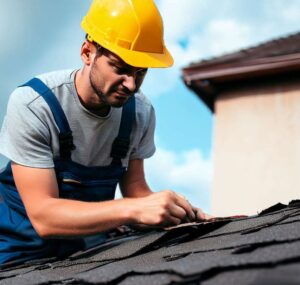Roofs are more than just a covering for our homes; they provide us with shelter, protection, and comfort. They shield us from rain, sun, and snow, and play a crucial role in maintaining the energy efficiency and overall well-being of our living spaces. However, like any other part of our home, roofs require regular care and attention to ensure they continue to serve their purpose effectively. This is where the importance of regular roof inspections comes into play. Not only do these inspections help maintain the integrity of your roof, but they can also save you a significant amount of money in the long run.
The Importance of a Healthy Roof
Imagine your roof as a steadfast guardian, shielding you from the unpredictable elements of the outside world. It’s not just a mere covering; it’s your fortress against nature’s forces. Beyond its protective role, a well-maintained roof plays a pivotal role in maintaining a comfortable indoor environment and promoting energy efficiency. During winter, it keeps the warmth in by preventing heat loss, while in summer, it blocks excessive heat from entering, ensuring a balanced climate inside your home.
However, dismissing the care your roof deserves can lead to dire consequences. Leaks, for instance, might seem like minor annoyances, but they can swiftly escalate into major problems. These insidious infiltrations can compromise your home’s structural integrity, giving rise to the need for costly repairs. Moreover, in damp and neglected conditions, mold can thrive, posing health hazards to you and your loved ones. A healthy roof is not just a matter of aesthetics; it’s a safeguard for your well-being and financial stability.
Understanding Regular Roof Inspections
Regular roof inspections play a pivotal role in upholding the durability and efficiency of your roof. These thorough evaluations involve a comprehensive analysis of your roof’s condition, offering crucial insights into its overall health and potential vulnerabilities. Typically advised to be conducted biannually or after extreme weather events, these inspections serve as essential check-ups for your home’s protective shield.

This assessment process covers both interior and exterior examinations. Internally, inspectors meticulously examine your attic or crawl space, seeking out signs of moisture intrusion like water stains or mold growth. They also assess ventilation, as improper airflow can lead to excessive moisture buildup, causing various issues over time.
Inspectors scrutinize the roof’s surface, paying close attention to shingles, tiles, flashing, and gutters. Their goal is to identify damaged, loose, or missing elements, as well as any visible indications of wear and tear. These professionals possess the expertise to detect potential weak points that might escape an untrained eye.
Although homeowners can perform basic visual checks themselves, professional inspections offer an unmatched level of scrutiny. Armed with years of experience and a profound understanding of roofing materials, trained inspectors are adept at unveiling concealed problems. They can detect issues that may not be immediately noticeable, such as small cracks or areas prone to water infiltration that could lead to extensive damage over time.
Professional inspectors provide the ability to accurately gauge the severity of any identified issues. They offer recommendations for effective solutions and prioritize repairs, empowering you to make well-informed decisions. This proactive approach prevents minor concerns from escalating into major, costly predicaments.
Regular roof inspections act as a proactive defense mechanism for your home. They facilitate the early detection of potential issues, mitigating the risk of unforeseen and expensive repairs down the road. By addressing problems at their inception, you extend your roof’s lifespan and safeguard your home’s structural integrity.
Financial Benefits of Regular Roof Inspections
Regular roof inspections offer substantial financial advantages that cannot be ignored. Their ability to identify minor issues in their early stages is a key factor in preventing these concerns from evolving into more substantial and expensive problems. Consider a seemingly insignificant crack in a shingle; if left unattended, it could gradually permit water infiltration, leading to damage within your home’s interior and ultimately demanding costly repairs. Swiftly addressing these modest issues can notably elongate your roof’s lifespan, sparing you the substantial expenditure of a premature roof replacement.
Furthermore, the fiscal benefits extend beyond direct repair costs. A well-maintained roof contributes to energy savings, a factor often underestimated. The proper insulation and ventilation offered by a healthy roof relieve the strain on your heating, ventilation, and air conditioning (HVAC) systems. This reduction in energy consumption translates to lower utility bills and aligns with your aspirations for a more ecologically responsible home.
In essence, regular roof inspections become a proactive approach not only to preserving your home’s structural integrity but also to safeguarding your financial resources. By addressing minor concerns before they magnify into major dilemmas and by ensuring energy efficiency, these inspections hold the potential to save you a significant amount of money over the long term. So, remember, investing in the well-being of your roof today can lead to substantial savings and a more secure financial future down the line.
Roof Inspection Process
When undergoing a professional roof inspection, a comprehensive procedure is followed to guarantee a thorough evaluation of every aspect concerning your roof’s condition. This meticulous approach ensures that no potential issues are overlooked. The process commences with an in-depth exterior assessment, during which experts meticulously examine the roof’s surface for any indications of damage. This includes scrutinizing shingles for cracks, checking for missing tiles, and identifying any visible signs of wear and tear.

Transitioning to the interior examination, the focus shifts towards uncovering potential problems that might not be immediately apparent from the outside. Water stains and possible mold growth are carefully sought out, as these can signal leaks or moisture infiltration. Additionally, the inspectors pay close attention to the ventilation systems within the attic to ensure that proper airflow is maintained, preventing the buildup of excess moisture that could lead to structural issues.
Perhaps equally important to the inspection itself is the detailed documentation of the inspectors’ findings. This record serves as a valuable point of reference for future inspections, allowing for a direct comparison of the roof’s condition over time. This not only aids in identifying trends in wear and tear but also assists in the development of effective maintenance strategies. In conclusion, a professional roof inspection is a meticulous and invaluable process that safeguards the integrity and longevity of your roof.
DIY vs. Professional Inspections
When it comes to inspecting your roof, there’s a crucial distinction between DIY assessments and enlisting professional services. While homeowners can certainly conduct basic visual checks on a regular basis, the advantages of opting for a professional inspection are undeniable. Professionals bring a wealth of expertise and experience to the table, which significantly enhances their ability to identify potential issues that might go unnoticed during casual inspections.
While DIY checks involve tasks like visually scanning your roof’s surface for any glaring signs of damage, such as loose or missing shingles, and conducting a basic assessment of your attic for potential leaks or water stains, these actions might only scratch the surface. On the other hand, professional inspectors possess the keen eye to detect even subtle indications of problems that might not be immediately apparent. Their detailed understanding of roofing systems allows them to provide precise solutions and recommendations, which is crucial for addressing issues effectively and preventing them from escalating.
Choosing the Right Roof Inspector
Selecting the right roof inspector is crucial to ensure a thorough and accurate assessment of your roof’s condition. Look for inspectors with proper credentials and certifications, and consider their experience in the field. Don’t hesitate to ask for references or read online reviews before making a decision.
Investing in regular roof inspections is a smart financial decision that can save you money in the long run. By preventing expensive repairs, extending the lifespan of your roof, lowering energy bills, and avoiding interior damage, you not only protect your home but also your wallet. Remember that proactive care is always more cost-effective than dealing with extensive repairs. So, take action today and schedule a professional roof inspection to ensure the longevity and protection of your cherished abode. Your roof will thank you, and so will your bank account.